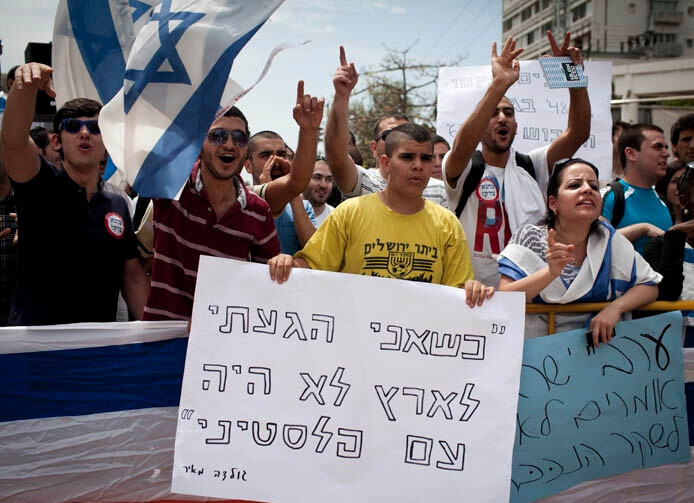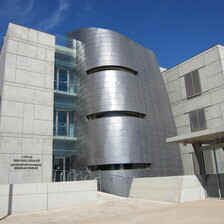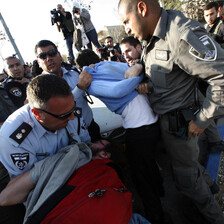The Electronic Intifada Haifa 15 July 2013

Tel Aviv University students hold anti-Palestinian signs during a protest of an event last year commemorating the 1948 ethnic cleansing of Palestine.
ActiveStillsVarious Israeli academic institutions have introduced courses and programs on hasbara — the Hebrew-language term used to describe Israel’s attempts to re-brand its image as its occupation and military aggression makes it increasingly unpopular worldwide.
A new report from the Academic Watch Project shows that instead of promoting critical thought and inquiry, these courses at academic institutions serve to promote the policies of the State of Israel and the whitewashing of its crimes. The Academic Watch Project is a group of Palestinian students at Israeli academic institutions dedicated to exposing discrimination within Israeli academia and its connection with Israel’s military occupation and apartheid policies.
“A Word on Hasbara” aims to uncover the content of these courses and programs and their funding. It also seeks to reveal their connections with the ministries of foreign affairs and public diplomacy and international Zionist groups.
“Unofficial ambassadors”
One such course — “Ambassadors Online” (or “Ambassadors on the Web”) — offered at Haifa University boasts the slogan “Volunteering, Zionism, Digital Diplomacy.”
The course’s webpage features the logos of two Israeli ministries as well as those of Birthright Israel and StandWithUs, groups which aim to promote Israel among US college students — and offers the synopsis: “[the] goal is to provide Israeli university students with the knowledge, skills and tools they need to become unofficial ambassadors of Israel. The cadets of the project receive training which prepares them to effectively challenge the de-legitimization claims, engage in a dialogue with anti-Israeli activists and improve Israel’s image abroad by expanding the positive knowledge about the country.”
Eli Avraham, a co-founder of the “Ambassadors on the Web” course, said in an interview with The Canadian Jewish news: “when false claims are made about Israel, such as labeling it an apartheid state, people need to be equipped with knowledge and tools to speak out against those claims.”
He added: “The main idea is that this is about how to use the new media to reclaim Israel’s narrative and promote Israel’s point of view” (“Haifa U course teaches web hasbara strategies,” 13 March 2012).
Year-long hasbara program
IDC Herzliya’s Ambassador Club is a year-long program for more than two hundred students from thirty countries run in partnership with StandWithUs. The program includes lectures on media, economy and history in order to “arm the students with the latest surveys and data and to teach them how to present the Israeli narrative” in North America and Europe. At the end of the course, each participant receives “an accreditation endorsed by the Israeli Ministry of Foreign Affairs,” according to the StandWithUs website.
Student unions at Israeli universities also provide hasbara programs. The National Union of Israeli Students aims to fight “anti-Semitism” and “delegitimization of the State of Israel” by paying Israeli students $2,000 in return for writing comments and letters on social network sites promoting Israel and “refuting” criticism of the state’s policies for five hours per week.
These hasbara courses were put into practice last November, when Israel bombed Gaza for eight consecutive days. The student union at IDC Herzliya, in coordination with the ministries of media and public diplomacy, formed “a war center” to promote the Israeli army and its aggression. The “war center” received information directly from the Israeli army and the prime minister’s office.
Coexistence lie
Even more cynically, these programs are being used to promote a false narrative of coexistence, like the one boasted in a recent Times of Israel piece on the Ambassadors Online program at Haifa University. The article, titled “Muslim, Druze and Jewish students band together to improve Israel’s global image,” describes how students are trained to undermine the global boycott Israel movement.
But despite the hasbara lie of Israel being a bastion of peace and coexistence, as the Haifa University program trains students to promote, the reality for Palestinian students at Israeli universities is much different.
While the Ambassadors Online participants “monitored the media for biased coverage and took part in the shaping of positive public opinion towards Israel” during the bombing of Gaza last November, Palestinian students at Haifa University who protested the attacks were demonized by the city’s mayor as “terrorist supporters” and banned by the university from demonstrating on campus.
What these hasbara programs ultimately reveal is that Israel is losing the public relations battle and is desperately investing massive resources into improving its image. The role of Israeli academic institutions in these deceptive efforts reaffirm their role in serving the policies of the state, rather than promoting academic values and integrity.
Yara Sa’di, a postgraduate student and activist from Haifa, drafted the Academic Watch Project report.






Comments
Excellent.
Permalink Hadiy'ya replied on
Excellent.
I'm a Haifa Univerisity student and I affirm what has been depicted by Yara.
We're being marginalized by the university's administration and the coexistence claim is a big fat lie.
What a sweet story, but it
Permalink Bill Crompton replied on
What a sweet story, but it does rather fit in with the "pope's a Catholic, chief rabbi's Jewish" news stories.
Any reader of UK papers, especially the Guardian, has been dealing with these people for years. They even set up hate-sites to attempt to put personal pressure on contributors.
See cifwatch.com and bbcwatch.com, for instances of Hasbara follow-up. If you contradict their spurious arguments, "there's a man on that forum taking names"...
Any reader of UK papers,
Permalink Aron replied on
Any reader of UK papers, especially the Guardian, has been dealing with these people for years
"these people" your ideals are transparent.
You are obviously telepathic
Permalink Bill Crompton replied on
You are obviously telepathic if you can see what my ideals are on the basis of two word, bearing in mind that the article was about paid propagandists and I used the shorthand "these people".
Mind you, i suppose I can assume from your reaction that you are one of "these people"...